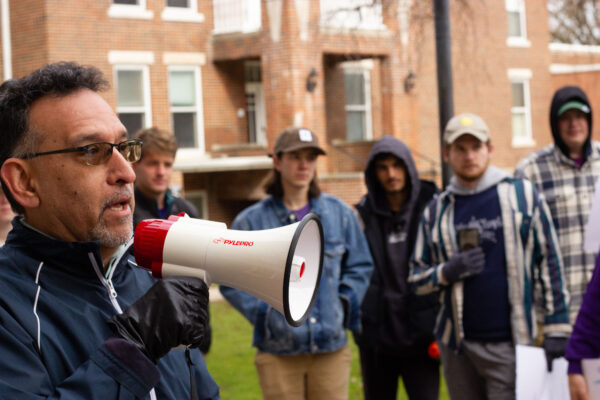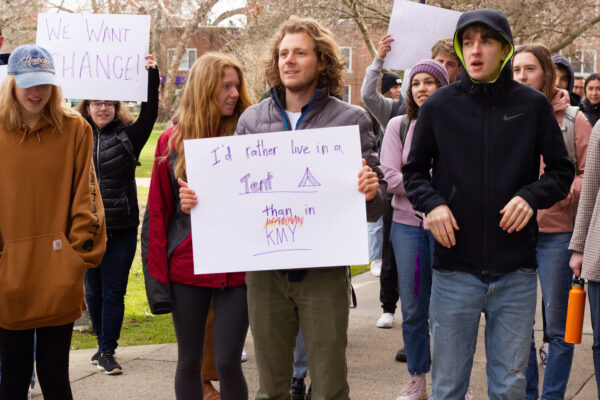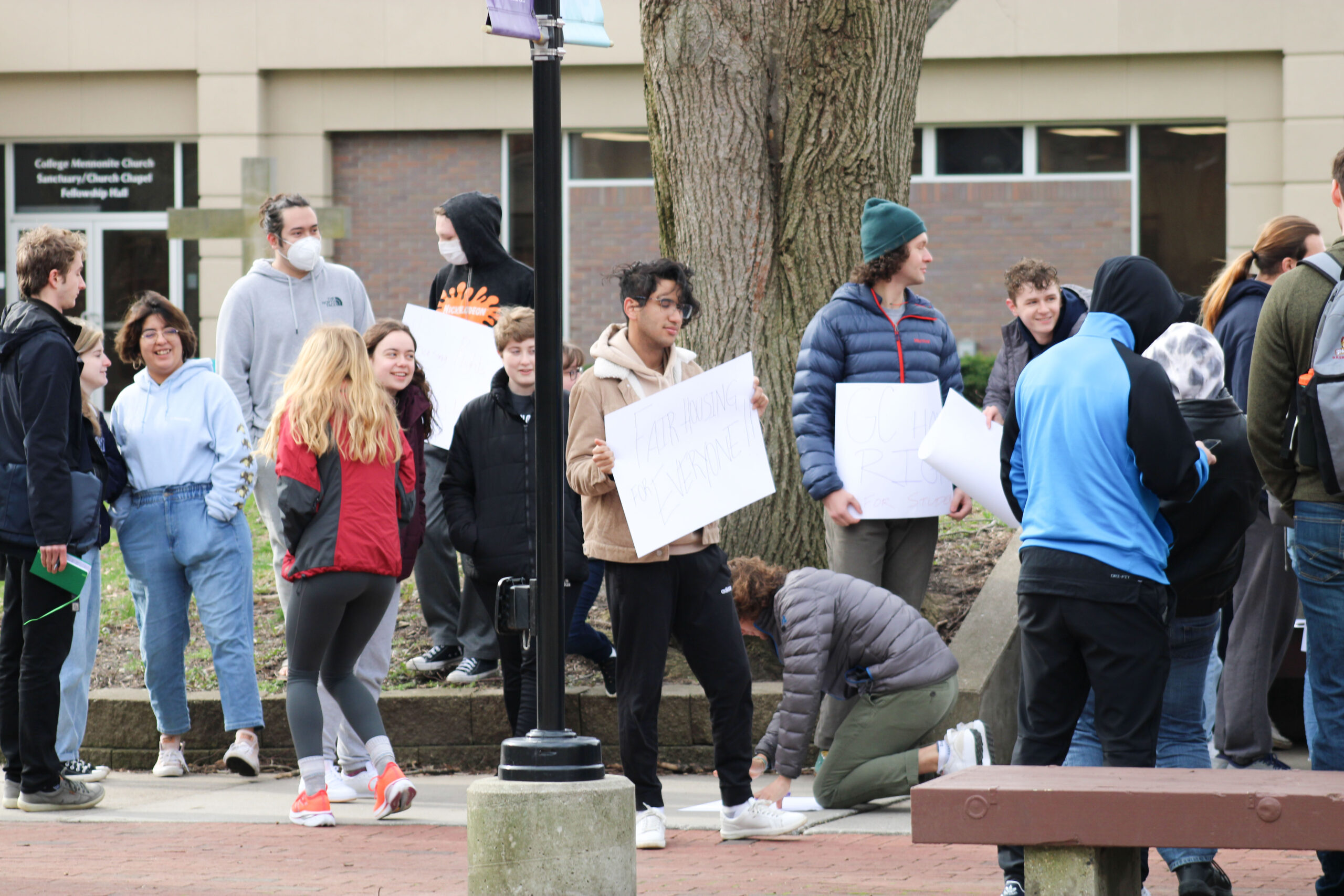Around 60 students gathered at Schrock Plaza at 10 a.m. today to protest this year’s surge in students waitlisted to the Romero student apartments and what students have described as a lack of transparency, communication and equity.
As people began to circle the fountain, music played and leaders encouraged attendees to make signs. After twenty minutes of an open-mic style session where students shared their frustrations, they walked to the Adelphian Fountain chanting “we want change” and posted their signs near the administration building. Students then offered Gilberto Pérez, Jr., dean of students and vice president for student life, the megaphone for a chance to respond to their concerns.Pérez, Jr. had three points in his response to the students. He first affirmed that this cause was bringing students together. He then expressed gratitude for the protest, urging students to “keep bringing up other causes to our attention.” Lastly, Pérez, Jr. acknowledged the “need for student life to listen better” and for more transparent communication.
 Gilberto Pérez, Jr., vice president for student life and dean of students, speaks to the crowd after they walked to the administration building. Liam Morris//The Record
Gilberto Pérez, Jr., vice president for student life and dean of students, speaks to the crowd after they walked to the administration building. Liam Morris//The Record
The protest centered around the fact that 33 students who applied for the apartments were initially waitlisted, facing the option of living in either the dorms or Kulp Hall. Chandler Buchfeller, director of residence life and housing, said that the waitlist is now down to 18 students, after seven students got into apartments, seven into Kulp Residence Hall and one into Kratz Residence Hall.
Pérez, Jr. and Buchfeller declined to specify any changes to the housing policy, but said that they would continue meeting with students and “exploring what spaces are available — policies are never static,” Pérez, Jr. said. He added that “searching for mutual respect and gaining trust” were other changes he hoped to see. The two of them also initiated talks with students in advance of the protest to hear student concerns.
Opening Coffman Hall to students next year has been a common request, but Pérez, Jr. responded that it’s not as simple as just opening the doors. Coffman Hall is a “flexible, surprisingly trafficked space,” Pérez, Jr. said, serving as housing for athletes in the winter, international students in the summer, visiting scholars and campus safety officers.
Daniel Eash-Scott, one of the student leaders of the protest, described how after sensing “lots of frustration … at a level I haven’t quite seen before,” he, along with Drew Smoker, Cormac Koop Liechty, Isaac Sawatzky and Seth Smith Kauffman decided to create a website on April 3.
“The whole thing took $12 and one hour to set up,” Eash-Scott said.
The website, gchousingrights.com, features a home page encouraging students to protest on Thursday and skip class, a sample email to send to professors for missing class and a statement signed by 287 students and community members.
According to Smoker and Eash-Scott, much of the frustration has been from a lack of transparency. “I have no issues with the policy itself of living on campus for four years,” Eash-Scott, a junior history major, said, “just with the implementation and lack of transparency.” Smoker said she and other students “felt hung out to dry.”
Eash-Scott wondered if administration and residence life knew that so many students would be waitlisted: “If not, then it’s really poor planning. If they did, then I’m more frustrated — there was no warning given or suggesting that the apartments would be competitive to get in.”
Buchfeller said that he “was not expecting to see [that many] students waitlisted, but it was not a surprising reality given how dynamic and flexible housing always is.” He also pointed out that if a cohort had the application submitted on time with a deposit, they were not waitlisted — all those waitlisted had either an element of the application submitted late or were missing a deposit.
As for Pérez, Jr., he acknowledged that “we could communicate better and show more resources … but I haven’t spoken to enough students yet to know what that looks like.” Buchfeller explained that he was still working on understanding the lack of transparency, noting that “all the information given on housing night has also been on our campus housing website” and that the deposit policy was unchanged this year.
Karmen Campos, a sophomore social work major, attended the protest and was one of the students who spoke impromptu, saying “there was no transparency” and that requiring deposits for “broke college students” wasn’t fair.
She later elaborated that as a student worker at the Recreation-Fitness Center, her monthly paycheck is $250-300, and being able to come up with the deposit was a struggle. Campos will be living in the apartments next year, but said she attended the protest for her friend and others who were waitlisted.
 Tanner Pinks, a senior elementary education and special education major, holds a sign during the protest. Liam Morris//The Record
Tanner Pinks, a senior elementary education and special education major, holds a sign during the protest. Liam Morris//The Record
Smoker, a junior engineering physics major, said that she “pushed so hard” for her two brothers to come to GC — and they are, next year — but said, “I don’t know if I would have encouraged them to come had I known this is what housing would look like for them.”
The new policy that seniors cannot live off campus — unless they live with their parents or are married — took effect this year. That, combined with the apartments being at capacity last year, indicated to Smoker that “obviously [housing] was going to be more full and … I think students could intuit that … but I don’t think there was any indication of just how many students would get waitlisted.”
Eash-Scott emphasized that their issue is not with requiring students to live on campus all four years: “Having students all on campus can bring us together … it’s the implementation and lack of warning, communication and listening” to students that spurred the protest. He added that “the administration is not out to get us. I have respect for GC. … I think they are an institution trying to work for students.”
Smith Kauffman, another of the student leaders, was only expecting “30 to 40 students” and was excited by the turnout. As for his hopes for the administration’s next steps, he said he was “partly optimistic … requiring us to be on campus isn’t a problem if there’s enough options.”
Even though he will be living in Howell House next year, Smith Kauffman said, “I could be waitlisted next year, and I’m worried about being able to continue having the experience of living with my peers.”
Chad Coleman, director of campus safety and student life operations, watched the protest from the sidelines. Coleman, the former director of housing, said that he came “to see what students were thinking and make sure they felt safe.” He also acknowledged that in his previous role with housing, “it’s difficult to manage 400 students’ desires.” As for whether he missed the job, Coleman said the position can be an “easy scapegoat — there’s no intent to be the bad guy; there’s just a job to do.”
Buchfeller wondered if students felt that residence life was “difficult to reach or they didn’t have access.” He said that he and his staff “are trying to help craft the best experience from students and not try to hide anything.” Buchfeller described “no reticence to connect” and that he was ready to answer any students’ questions and emails.
Smith Kauffman appreciated the response from the administration, but after Pérez, Jr. spoke at the protest, noted the desire for sustained action.
“Conversation and understanding are nice,” he said. “But as we chanted, ‘we want change.’ Policy matters.”



